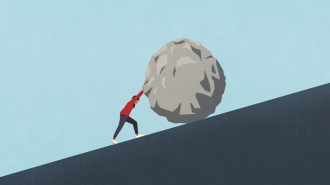Kids’ friendships sometimes illusory
Surprisingly often, grade-schoolers say they're tight with a peer who actually dislikes them
In the brutal social world of elementary school, friendship can be deceptive. It’s relatively common for children to consider as a friend a classmate who admits disliking them but seems affable on the surface, researchers say.
“The common prevalence of unbalanced relationships, where children believe themselves to be friends with someone who actually dislikes them, is surprising,” says James Olsen, a psychologist at the University of Memphis in Tennessee.
Unbalanced relationships of this sort comprised 12 percent of third to sixth graders’ classroom relationships in a university-affiliated elementary school, Olsen and his colleagues report in a paper published online January 13 in Personal Relationships. That figure exceeded the nearly 10 percent of kids’ relationships in which each child dislikes the other.
One-quarter of classroom relationships consisted of two-way friendships. Remaining pairings mainly included cases in which one child acknowledged another as a friend or as especially disliked, but the second child expressed no opinion about the first.
Not so surprisingly, aggressive and otherwise socially troubled third to sixth graders often believed they were friends with kids who disliked them, the researchers say. On the other side of the equation, kids who got labeled as buddies by a classmate they disliked got along well with others and had plenty of genuine friends.
Unbalanced friendships have received little attention from researchers, Olsen notes. Prior research on social development has focused on pairs of children who say that they mutually like or dislike each other.
In the new investigation, disliked youngsters possibly wanted or needed to view relatively popular kids as friends, despite getting rebuffed or ignored. In many cases, though, disliked kids may have mistaken the kindness of socially skilled kids for friendship, Olsen proposes.
His team had 219 children in 10 elementary school classrooms circle the names of their friends and of kids that they “liked the least” on classroom rosters. Children also rated how much they liked each of their classmates on a six-point scale, from “very little” to “very much.” Children came from middle-class homes. The sample was about evenly split between white and black kids.
On separate rosters, kids circled the names of classmates who got along with and respected others, tried to get their way through force or withdrew in social situations.
Olsen’s team identified a total of 2,313 relationships between classmates. In about one-third of them, one child tagged another as a friend or a least-liked classmate, while the second child disregarded the first. Some of these one-sided friendships or animosities may reflect false perceptions about a classmate.
It’s also possible that these relationships are in the process of changing from mutual friendships or animosities to a state of mutual disregard, where each kid sees the other as neither friend nor foe, Olsen says. About 13 percent of classroom relationships in the study fit that description.
Earlier research suggests that two-thirds of grade school students, even those that are withdrawn or aggressive, have a mutual friend and often one with good social skills, remarks psychologist Kenneth Rubin of the University of Maryland in College Park. Olsen suspects those estimates are high and may include unbalanced relationships.
“The question is,” according to Rubin, “what is the quality of all these friendship mixes, and are they helpful, supportive and fun?”







